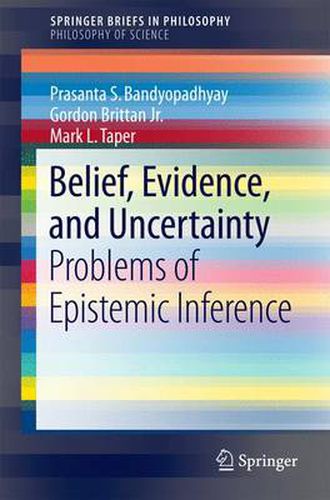Readings Newsletter
Become a Readings Member to make your shopping experience even easier.
Sign in or sign up for free!
You’re not far away from qualifying for FREE standard shipping within Australia
You’ve qualified for FREE standard shipping within Australia
The cart is loading…






This title is printed to order. This book may have been self-published. If so, we cannot guarantee the quality of the content. In the main most books will have gone through the editing process however some may not. We therefore suggest that you be aware of this before ordering this book. If in doubt check either the author or publisher’s details as we are unable to accept any returns unless they are faulty. Please contact us if you have any questions.
This work breaks new ground by carefully distinguishing the concepts of belief, confirmation, and evidence and then integrating them into a better understanding of personal and scientific epistemologies. It outlines a probabilistic framework in which subjective features of personal knowledge and objective features of public knowledge have their true place. It also discusses the bearings of some statistical theorems on both formal and traditional epistemologies while showing how some of the existing paradoxes in both can be resolved with the help of this framework.This book has two central aims: First, to make precise a distinction between the concepts of confirmation and evidence and to argue that failure to recognize this distinction is the source of certain otherwise intractable epistemological problems. The second goal is to demonstrate to philosophers the fundamental importance of statistical and probabilistic methods, at stake in the uncertain conditions in which for the most part we lead our lives, not simply to inferential practice in science, where they are now standard, but to epistemic inference in other contexts as well. Although the argument is rigorous, it is also accessible. No technical knowledge beyond the rudiments of probability theory, arithmetic, and algebra is presupposed, otherwise unfamiliar terms are always defined and a number of concrete examples are given. At the same time, fresh analyses are offered with a discussion of statistical and epistemic reasoning by philosophers. This book will also be of interest to scientists and statisticians looking for a larger view of their own inferential techniques.The book concludes with a technical appendix which introduces an evidential approach to multi-model inference as an alternative to Bayesian model averaging.
$9.00 standard shipping within Australia
FREE standard shipping within Australia for orders over $100.00
Express & International shipping calculated at checkout
This title is printed to order. This book may have been self-published. If so, we cannot guarantee the quality of the content. In the main most books will have gone through the editing process however some may not. We therefore suggest that you be aware of this before ordering this book. If in doubt check either the author or publisher’s details as we are unable to accept any returns unless they are faulty. Please contact us if you have any questions.
This work breaks new ground by carefully distinguishing the concepts of belief, confirmation, and evidence and then integrating them into a better understanding of personal and scientific epistemologies. It outlines a probabilistic framework in which subjective features of personal knowledge and objective features of public knowledge have their true place. It also discusses the bearings of some statistical theorems on both formal and traditional epistemologies while showing how some of the existing paradoxes in both can be resolved with the help of this framework.This book has two central aims: First, to make precise a distinction between the concepts of confirmation and evidence and to argue that failure to recognize this distinction is the source of certain otherwise intractable epistemological problems. The second goal is to demonstrate to philosophers the fundamental importance of statistical and probabilistic methods, at stake in the uncertain conditions in which for the most part we lead our lives, not simply to inferential practice in science, where they are now standard, but to epistemic inference in other contexts as well. Although the argument is rigorous, it is also accessible. No technical knowledge beyond the rudiments of probability theory, arithmetic, and algebra is presupposed, otherwise unfamiliar terms are always defined and a number of concrete examples are given. At the same time, fresh analyses are offered with a discussion of statistical and epistemic reasoning by philosophers. This book will also be of interest to scientists and statisticians looking for a larger view of their own inferential techniques.The book concludes with a technical appendix which introduces an evidential approach to multi-model inference as an alternative to Bayesian model averaging.